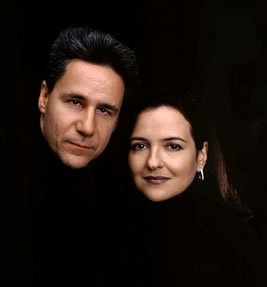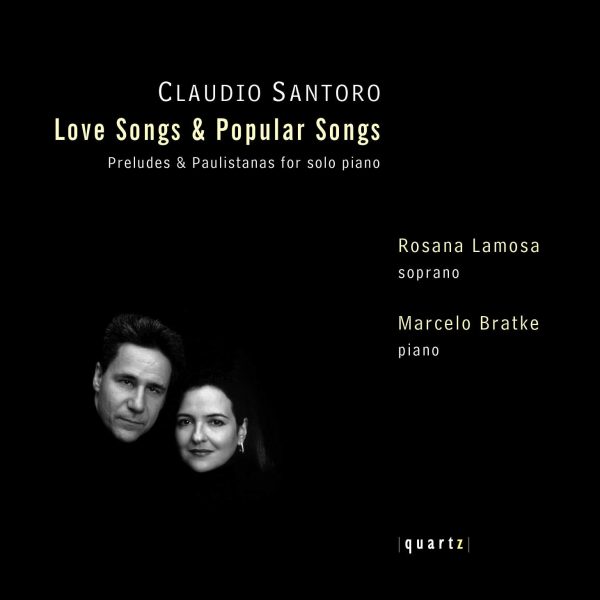Marcelo Bratke & Rosana Lamosa

MARCELO BRATKE
Marcelo Bratke was born in 1960 in Sao Paulo, where he began his piano studies in his early teens . He was a promising pupil ; in 2002, his CD “Les Groupe des Six” was voted by Gramophone Magazine as one of the greatest classical recordings of all time.
In 1976, after just one year of piano lessons, the sixteen year old Bratke had won the Sao Paulo Art Critics’ Association “Revelation Prize” for a performance of Bach’s D minor concerto. It was performed with the Sao Paulo State Symphony Orchestra, conducted by Eleazar de Carvalho.
Quickly established as one of Brazil’s leading young pianists, in 1982 Bratke settled in New York to study at the Juilliard School of Music; he was 22. Afterwards, travelling through Europe, he won first prize at Italy’s Tradate International Piano Competition.
In 1988, after completing his musical studies, Bratke moved to London. Since then he has performed at the Salzburg Festival and at Europe’s most coveted venues, including the Wigmore and Queen Elizabeth halls in London and the Konzerthaus in Berlin.
Marcelo Bratke began his acclaimed recordings for the Olympia label (UK) in the early 1990s. These have celebrated the Brazilian rhythms of Ernesto Nazareth and Darius Milhaud, the radicalism of Berg and Webern, as well as the children’s world of Heitor Villa-Lobos. Bach and Schubert are also in Bratke’s discography. With pianist Marcela Roggeri (Etcetera label) he went on to perform works for two pianos by Aaron Copland. Bratke has also collaborated for the “Imaginary Line” CD series with jazz pianist Julian Joseph.
In 2001, Bratke won the esteemed Carlos Gomes Award; his engagements over the next two years included “400 Years of Modern Music” at London’s Queen Elizabeth Hall, the Festival Transclassiques in Paris, as well as “Marcelo Bratke and Guests” at the Teatro Alfa International Season (Sao Paulo). He has also performed for Brazilian President Fernando Henrique Cardoso at the Palazzo Pamphilj in Rome, and played to over 80,000 people in a series of 45 concerts for his “Circuito Cultural Banco do Brasil” tour.
Marcelo Bratke recently made an impressive debut at Carnegie Hall in New York with a concert entitled “Carnaval Trilogy”, conceived and directed by himself.
ROSANA LAMOSA
One of Brazil’s most sought-after sopranos, Rosana Lamosa was born and brought up in Rio de Janeiro, studying initially with Vera Cano e Mello, then Leilah Farah in São Paulo and maestro Franco Iglesias at the Centre of Opera Performance in New York. Her international career began in 1992 with concerts in Asia and Europe, in particular Portugal and Switzerland where she was a soloist at the Stadttheater in St. Gallen.
In 1998 she took the lead role in the world premiere of Alma by Claudio Santoro at Teatro Amazonas in Manaus.
Her repertoire includes Il Guarany, La Traviata, Elisir d’Amore, Carmen, La Boheme, Don Giovanni, The Marriage of Figaro, Suor Angelica, Orfeo and Eurydice and Don Casmurro,as well as oratorios, masses and cantatas that she has performed in Europe and South America.
In 1999 Lamosa sang Haydn’s Creation for the opening of Orquestra Sinfônica do Estado de Sao Paulo’s season, Mahler’s Second Symphony and Beethoven’s Ninth Symphony at Copacabana Fortress. Lamosa has regularly appeared at events including the “Aquarius Project” (Jornal O Globo), “Natal na Lagoa” Avon’s “Women in Concert”, the celebration of the 500th aniversary of Brazil’s discovery and has been invited to sing at Maracano Stadium to mark the Pope’s visit to Brazil.
Rosana Lamosa won the APCA (Critic’s Association of Sao Paulo) best singer awards for 1996 and 1999. In 2002 the São Paulo State Department of Culture presented her with the “Carlos Gomes Prize” for her outstanding career in singing and, in the same year, she sang in opera productions at the Teatro Alfa in Sao Paulo, Teatro Sao Carlos in Lisbon, Teatro Amazonas (Manon and La Sonnambula), Teatro Municipal in Rio de Janeiro (Mozart’s Mass in C and Carmina Burana).
Her discography includes Bachianas Brasileiras No 5 by Heitor Villa-Lobos (Naxos) and Jupyra by Francisco Braga (Bis).
Recordings:
